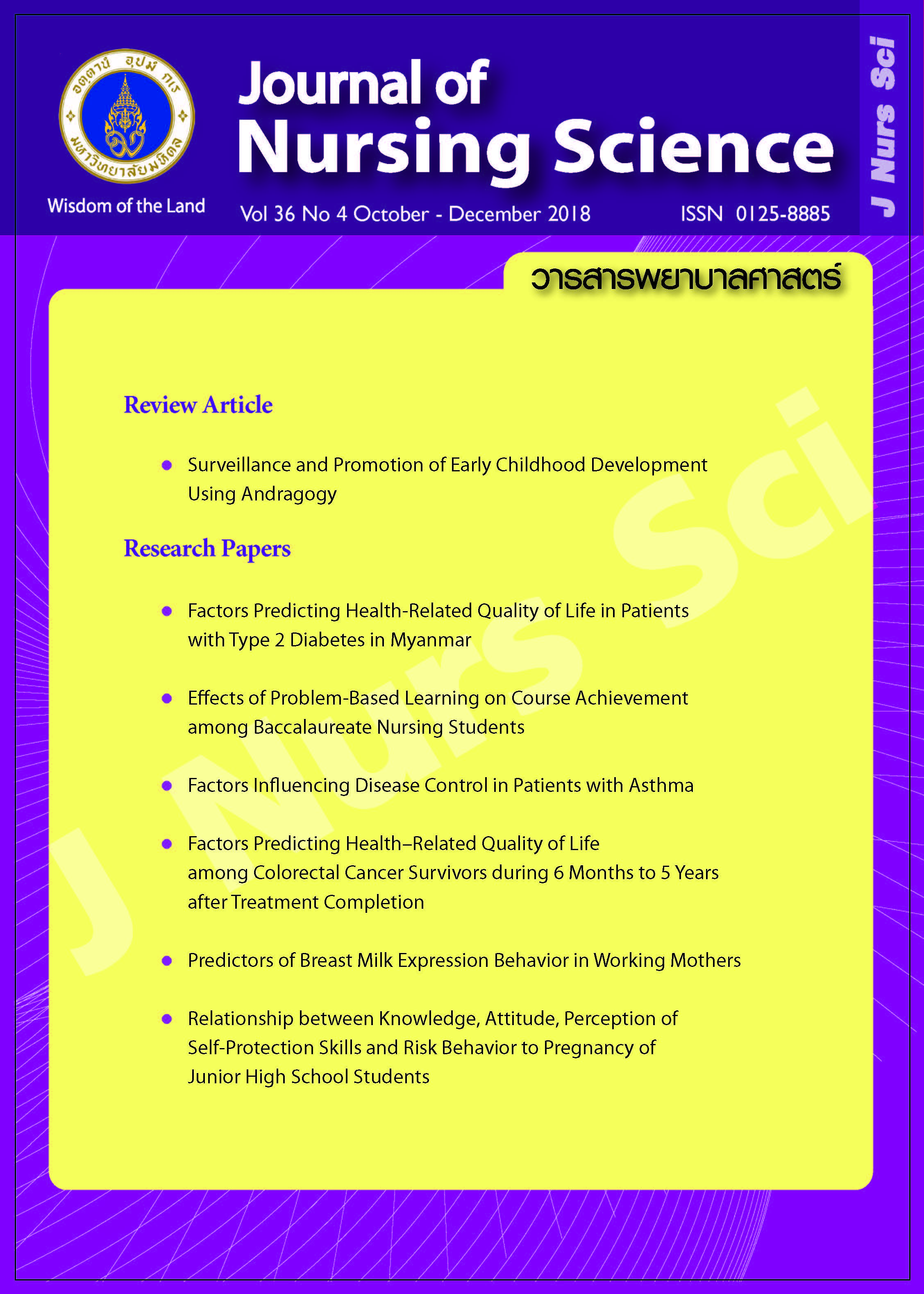Effects of Problem-Based Learning on Course Achievement among Baccalaureate Nursing Students
Main Article Content
Abstract
Purpose: To study the effects of using Problem-Based Learning (PBL) approach on the course achievement among nursing baccalaureate students and their opinion on the use of PBL approach.
Design: Quasi-experimental study.
Methods: Convenience sampling was used to select fourth-year nursing students participating in the study. PBL approach was used as the intervention with 70 students (the PBL group) while lecture method was employed with 76 students (the lecture group). Course content examination was used to measure the course achievement in both groups. PBL Evaluation Questionnaire and open ended questions were used to evaluate the opinion in the PBL group only. Data were analyzed
using descriptive statistics, Chi-square test and independent t-test.
Main findings: The PBL group had significantly higher score (t = 7.23, p < .001) on course achievement than the lecture group. More number of students in the PBL group passed this topic, compared to those in the lecture group. The students considered PBL as a highly effective approach; however, shy and quiet students reported that PBL approach made them felt stressful during small group discussion and information exchange.
Conclusion and recommendations: PBL was an effective approach to improve students’ course achievement. However, some quiet students might have difficulty to speak up or feel pressure during PBL process. Thus, a PBL group should make up of different personalities that complement one another by stimulating each other and mutually learning and sharing.
Article Details
Copyright Notice: Nursing Science Journal of Thailand has exclusive rights to publish and distribute the manuscript and all contents therein. Without the journal’s permission, the dissemination of the manuscript in another journal or online, and the reproduction of the manuscript for non-educational purpose are prohibited.

Disclaimer: The opinion expressed and figures provided in this journal, NSJT, are the sole responsibility of the authors. The editorial board bears no responsibility in this regard.
References
2. World Bank. The learning pyramid [Internet]. Washington, DC: World Bank; [cited 2016 Jun 29]. Available from: https://siteresources.worldbank.org/DEVMARKETPLACE/Resources/Handout_TheLearningPyramid.pdf.
3. Praboromarajchanok Institute for Health Workforce Development. Teacher manual for problem based learning lesson plan for nursing colleges under Praboromarajchanok Institute for Health Workforce Development. 1st ed. Nonthaburi: Yutharint Printing; 2015.
(in Thai).
4. Tork HMM, Shahin ESM. The effectiveness of Problem Based Learning (PBL) in nursing education: cross-cultural student’s perspective. Journal of American Science. 2011;7(11):516-21.
5. Yuan H, Williams BA, Fan L. A systematic review of selected evidence on developing nursing students’ critical thinking through problem-based learning. Nurse Educ Today. 2008;(28):657-63.
6. Kong LN, Qin B, Zhou YQ, Mou SY, Gao HM. The effectiveness of problem-based learning on development of nursing students’ critical thinking: a systematic review and meta-analysis. Int J Nurs Stud. 2014;51(3):458-69.
7. Puttiwanit N, Puttiwanit S, Suwanraj M, Kaewmahakam O. Effect of problem-based learning on intellectual skills of nursing student in nursing of persons with health problem I subject. The Southern College Network Journal of Nursing and Public Health. 2017;4(1):1-14.
8. Tayyeb R. Effectiveness of problem-based learning as an instructional tool for acquisition of content knowledge and promotion of critical thinking among medical students. JCPSP-J Coll Physici. 2013;23(1):42-6.
9. Yuan H. Effects of problem-based learning on critical thinking skills and course achievement among Chinese baccalaureate nursing students [dissertation]. Chiang Mai: Chiang Mai University; 2007. 204 p.
10. Nanthachai N, Lichanporn I. The study process by problem-based learning method in food science and technology [Internet]. Pathum Thani: Rajamangala University of Technology Thanyaburi; 2011 [cited 2017 Oct 1]. Available from: www.agr.rmutt.ac.th/wp-content/uploads/25570710-thesis/Operatingdirection/งบรายได้/1.กระบวนการเรียนการสอนในรูปแบบ Problem – based Learning.pdf. (in Thai).
11. Jacobs GM. Introverts can succeed with cooperative learning. Parole. 2014;4(1):83-93.
12. Eräpuro-Piila L, Haka M, Dietrich P, Kujala J. Problem-based learning in university education: do psychological preferences make a difference? International Journal of Management in Education. 2014;8(2):101-6.


